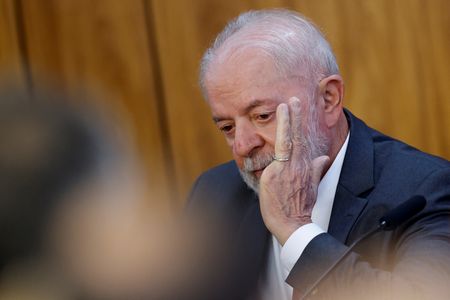BRASILIA (Reuters) -Brazil’s central government posted a larger-than-expected primary budget deficit in May, pressured by increased pension benefits, the Treasury said on Wednesday.
The deficit excluding interest payments totaled 60.983 billion reais ($11.06 billion), larger than the 54.2 billion reais shortfall forecast by economists in a Reuters poll.
Government spending rose by 14% in real terms from a year earlier, driven by an uptick in pension benefits, compared to a 9% increase in net revenues.
Tax collection in Latin America’s largest economy has been hitting successive monthly records.
However, the market does not see this as enough to back the government’s fiscal target of erasing the primary deficit this year, due to the rapid expansion of many mandatory expenditures, and President Luiz Inacio Lula da Silva’s reluctance to cut spending.
Treasury Secretary Rogerio Ceron said that changes to the 2024 fiscal target are not on the table, underlining that the government believes the goal to be “viable.”
Speaking at a press conference, he acknowledged that the growth of pension benefits deserves attention to avoid creating dynamics incompatible with the spending limit.
According to Ceron, any additional measures will be taken if needed to ensure the accomplishment of the fiscal target, adding that a review of registries is being conducted to identify beneficiaries who may not be eligible for government support policies.
In the 12 months through May, the central government’s primary deficit reached 2.36% of gross domestic product (GDP), said the Treasury.
Leftist President Luiz Inacio Lula da Silva said earlier on Wednesday in an interview with news outlet UOL that it was not possible to unlink the annual increase in a benefit for the elderly and disabled, the so-called BPC, from the growth of the minimum wage, which is annually adjusted above inflation.
Some members of his government had suggested that raising the BPC only by the inflation rate would be one of the alternatives presented to him for potential spending cuts.
The president also said his government is scrutinizing whether there are areas with excessive expenses.
“The problem is not having to cut. It’s knowing whether it is really necessary to cut or if it is necessary to increase revenue,” Lula said in comments that led the Brazilian real to extend its drop against the U.S. dollar.
The Treasury secretary said that the president’s government does not seek a minimal state, but one that will balance social demands with fiscal responsibility. Ceron said that Lula’s willingness to review expenditures had not resonated with the market as much as other remarks on the fiscal situation.
($1 = 5.5149 reais)
(Reporting by Marcela Ayres, Editing by Chris Reese, Aurora Ellis and Timothy Heritage)





